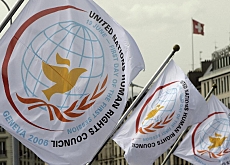New UN rights body is back to old tricks

The Swiss government is becoming increasingly concerned by the politicisation of the fledgling United Nations Human Rights Council, which is based in Geneva.
At a special session on Wednesday the 47-strong body passed a resolution drafted by Arab and Muslim states condemning “gross human rights violations” by Israel.
It was the third time that Israel had been singled out for criticism since the council opened for business in June this year.
The resolution also called for a UN mission to be sent to investigate the deaths of at least 18 Palestinians in Beit Hanoun earlier this month. It did not mention Palestinian attacks against Israel.
It was adopted by 32 votes to eight, with six abstentions. Switzerland abstained but most European Union members of the council voted against the resolution because they considered it too one-sided.
The meeting came a week after Foreign Minister Micheline Calmy-Rey for the first time voiced her frustration at the body, which is the result of a Swiss initiative.
Speaking in Brussels, she warned that its reputation was suffering because some countries were more intent on scoring political points than tackling human rights in an objective way.
The creation of the council earlier this year was hailed in many quarters as a new dawn for the rights of the world’s oppressed after years of frustration and inaction.
Its predecessor, the Human Rights Commission, was widely discredited after serial abusers such as Libya, Zimbabwe and Cuba won seats and avoided censure.
Speaking at the close of its final session, UN High Commissioner for Human Rights Louise Arbour called for a “profound culture shift” in attitudes. But the new council has quickly reverted to the regional groupings of the past, with Israel marked as public enemy number one.
Gaza incursion
The latest resolution condemning Israel’s recent incursion into Gaza and the Beit Hanoun killings was drafted by Bahrain and Pakistan on behalf of Arab and Islamic states.
The council’s two previous special sessions in July and August were devoted to the Palestinian territories and the conflict in Lebanon respectively. Humanitarian crises in Sudan’s Darfur region, Chechnya and Sri Lanka have yet to make it onto the agenda.
“The Middle East does not have a monopoly on human rights violations,” Blaise Godet, Switzerland’s ambassador to the UN in Geneva, told swissinfo ahead of Wednesday’s special session.
In the run-up to the creation of the new human rights watchdog, a number of countries, including Switzerland and the United States, as well as a coalition of 45 non-governmental organisations warned that tougher membership criteria were needed to prevent it going the same way as its predecessor.
Hillel Neuer, executive director of UN Watch, told swissinfo that the extent of the “bias” against Israel was even more extreme than NGOs had predicted.
He said that while there were legitimate issues to be discussed regarding Israeli action in the Middle East, these were only being treated in a one-sided way.
“It [the council] couldn’t have got off to a worse start,” said Neuer. “We predicted business as usual just because if it’s the same ingredients you’re going to wind up with the same soup.”
According to UN Watch, 47 per cent of the council is made up of undemocratic countries, as opposed to 55 per cent for the defunct commission.
Lack of courage
Neuer said he was also disappointed by the failure of some western countries, including Switzerland, to take a strong lead either in raising issues such as Darfur or against the repeated targeting of Israel.
“There has been no political will to do that at all,” he said. “The whole point of the Human Rights Council is to shed light on a compelling abuse and we haven’t even seen an attempt on any other issues.”
Speaking on Wednesday, Godet “deplored” the attack on Beit Hanoun, while at the same time condemning Palestinian rocket fire against Israeli civilians. He called for both sides to exercise self-restraint and respect international law.
“The fact that the council is meeting for the third time on the situation in the Middle East shows the intensity of this conflict,” he said.
Israeli ambassador Itzhak Levanon said the special session was just another example of the council’s lack of objectivity and the “one-sided resolution” would plunge the rights body into politicisation.
“Those who pushed for this special session are conspicuously ignoring tragedies in other parts of the planet,” he said.
swissinfo, Adam Beaumont in Geneva
The UN Human Rights Council meets at least three times a year for a minimum of ten weeks and can call emergency sessions to respond to crises.
It is the most senior UN body based in Geneva.
Switzerland was elected to the council with a three-year mandate on May 9.
A country needs the support of at least 16 members to call a special session.
The resolution condemning Israel was supported by a majority of council members, among them: Algeria, Azerbaijan, Bahrain, Bangladesh, Brazil, China, Cuba, Ghana, India, Indonesia, Jordan, Malaysia, Mauritius, Morocco, Nigeria, Pakistan, the Philippines, Russia, Saudi Arabia, Senegal, South Africa, Sri Lanka, Tunisia and Zambia.
On Saturday the US vetoed a UN Security Council resolution condemning the Israeli attack on Beit Hanoun in which a number of children died.

In compliance with the JTI standards
More: SWI swissinfo.ch certified by the Journalism Trust Initiative










You can find an overview of ongoing debates with our journalists here . Please join us!
If you want to start a conversation about a topic raised in this article or want to report factual errors, email us at english@swissinfo.ch.